Posts by Christopher Lochhead
153 The Three Marketing Metrics That Matter
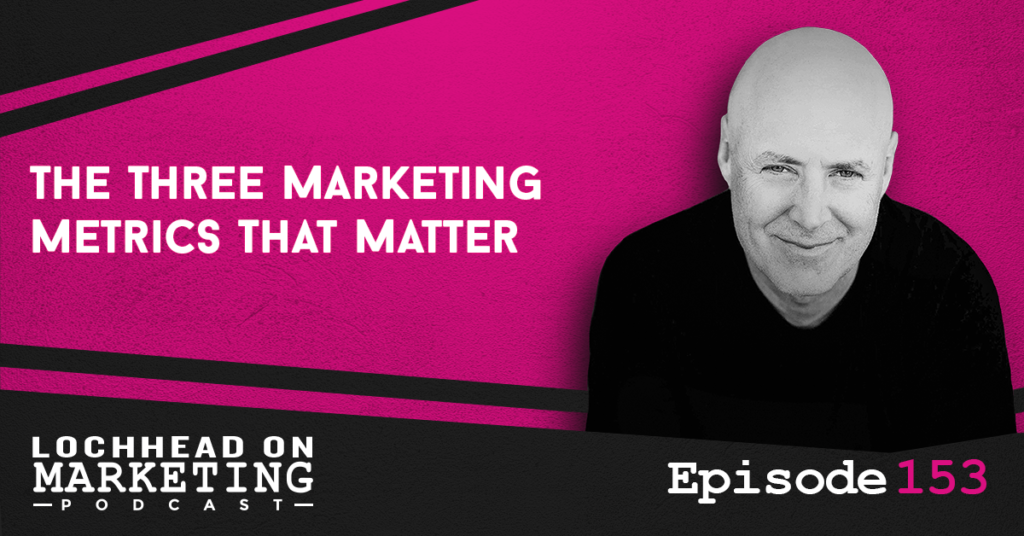
Podcast (lochheadonmarketing): Play in new window | Download (Duration: 13:37 — 9.4MB) | Embed
Subscribe: Apple Podcasts | Spotify | RSS | More
On this episode of Lochhead on Marketing, let’s talk about the three marketing metrics that matter. Because it appears as if there’s still a lot of confusion out there about this. So I thought we could unpack the real metrics that matter for marketing.
Welcome to Lochhead on Marketing. The number one charting marketing podcast for marketers, category designers, and entrepreneurs with a different mind.
The Three Marketing Metrics
Now, let’s talk about the three marketing metrics that matter, and break them down.
Marketing that does not drive revenue is not marketing
A lot of the counterarguments that I have received on this point is that marketing stuff people do can drive revenue. But the thing is, most of them do not drive long-term revenue. So if it doesn’t make the cash register sing consistently, It ain’t got that thing.
But what about brand advertising or Awareness campaigns? Those things only matter if you already have revenue coming in over time. If you’re trying to build up awareness and brand before putting up a good product and making good revenue out of it, that’s like putting the cart in front of the horse.
Marketing that does not drive category potential is not marketing
Related to creating revenue, is building up category potential. It’s important, as it helps build demand for your product, whether you are creating a new category, or revolutionizing one with your product.
Because when you have the ability to create demand, it will convert to revenue over time, which circles back to the first metric.
Marketing that does drive increases in the market cap or valuation is not marketing
Here’s the AHA for the third metric: investors in growth companies and stocks buy potential, not performance.
What drives our market cap is the investor’s perception of the size and growth rate of the category that we’re designing. Be their belief about our ability to prosecute the magic triangle, product, company, and category and earn 76% of the economics in the category that we are designing, because that’s the average number that the average category cleaner can get.
The other metrics like revenue growth, customer growth, margin growth, etc. are all metrics that validate that this company has massive potential.
How Legendary Marketing Executives do it
The most legendary marketing executives, CEOs and entrepreneurs, when they talk to investors, the first thing they say is that we are designing a legendary new market category that has massive growth potential. And let me tell you why. So they start with the potential and marketing creates that perception and then helps the company turn perception into reality.
Those are the metrics that matter: marketing needs to drive revenue, marketing needs to drive category potential, and then marketing needs to convert category potential in the eyes of investors into market cap. Because the company with the biggest market cap that is sustainable, I’m not talking about some kind of bullshit magic trick here. I’m talking about building enduring value over time. as measured by market cap, the number one market cap company in the category, always wins.
Revenue, of course, is a critical metric for driving market cap. But it’s not the only one. The perception of the future is actually more important from a market cap perspective. And so marketing drives revenue, short-term, medium-term, and long-term marketing drives market potential.
To listen to a more detailed explanation of the three marketing metrics, download and listen to this episode.
Bio
Christopher Lochhead is a #1 Apple podcaster and #1 Amazon bestselling co-author of books: Niche Down and Play Bigger.
He has been an advisor to over 50 venture-backed startups; a former three-time Silicon Valley public company CMO and an entrepreneur.
Furthermore, he has been called “one of the best minds in marketing” by The Marketing Journal, a “Human Exclamation Point” by Fast Company, a “quasar” by NBA legend Bill Walton and “off-putting to some” by The Economist.
In addition, he served as a chief marketing officer of software juggernaut Mercury Interactive. Hewlett-Packard acquired the company in 2006, for $4.5 billion.
He also co-founded the marketing consulting firm LOCHHEAD; the founding CMO of Internet consulting firm Scient, and served as head of marketing at the CRM software firm Vantive.
We hope you enjoyed this episode of Lochhead on Marketing™! Christopher loves hearing from his listeners. Feel free to email him, connect on Facebook, Twitter, Instagram, and subscribe on iTunes!
280 Future of Crypto, The Economy, Silicon Valley Startups & More with Sequoia Partner Michelle Bailhe
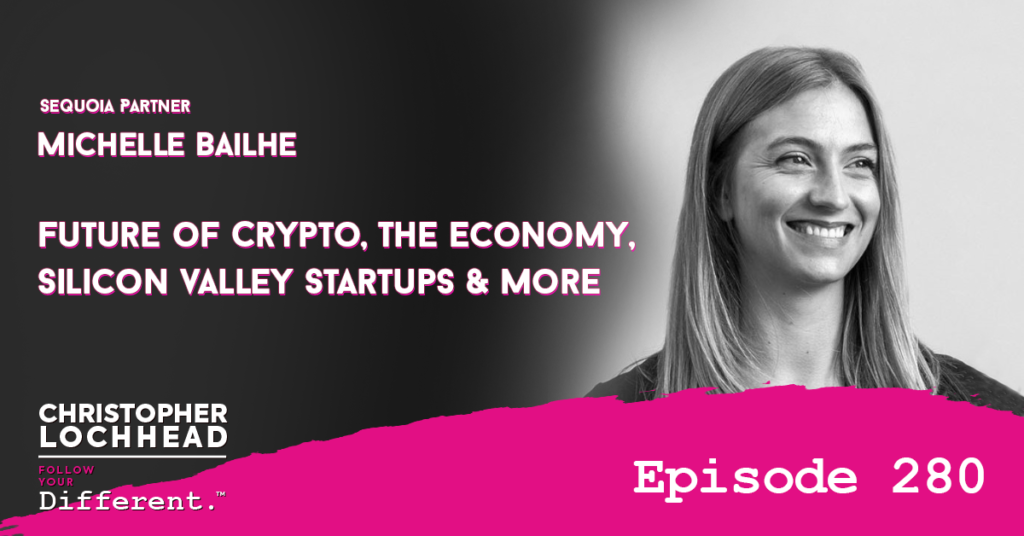
Podcast: Play in new window | Download (Duration: 1:25:06 — 58.4MB) | Embed
Subscribe: Apple Podcasts | Spotify | Pandora | RSS | More
The turmoil in the economy and stock market has created massive turmoil not only in Fiat currencies, but also in Cryptocurrency. As such, Silicon Valley tech entrepreneurs are bracing for tough times. Today at Christopher Lochhead: Follow Your Different, we are here to make sense of it all with Sequoia Partner Michelle Bailhe.
As you know, Sequoia is one of the giants of venture tech in Silicon Valley, and I have known and worked with the folks at Sequoia for over 20 years. Today, we get to hear from one of their partners and learn what advice Sequoia is currently giving to their entrepreneurs and much more.
Michelle Bailhe and I go deep on what’s really going on with the crypto markets as they face their first meaningful downturn. Why bad times tend to yield great entrepreneurs and startups, and what we can learn from the 1600s.
Michelle Bailhe on the crypto market
The conversation starts off on the topic of the crypto markets. Michelle shares that she thinks crypto is in a very interesting moment, for a lot of reasons.
While crypto has its own problems, on top of the current economic conditions, Michelle thinks it can weather the situation.
“Crypto has been through a lot of bear and bull markets, or winters and summers. And so there’s a sense of, well this is winter, and we have been here before. We know what it’s like, and we know how to build through it.” – Michelle Bailhe
Though according to Michelle, it’s worth noting that what lies in the future may be way different than before. For one thing, valuation will be unlike before when crypto was on the rise, and investors are savvier than before. So it’s all a matter of how crypto will adapt and integrate itself into the market in the long run.
Crypto’s first downturn
When asked when the first downturn was for crypto, Michelle explains that crypto has had its ups and downs over the years. As to why it went unnoticed, it was mostly due to the issues being with crypto itself, and not due to external factors.
As for whether Covid had anything to do with it, 2020 was actually an explosion of new cryptos due to people taking an interest in investing and growing their current funds. Though it wasn’t all for the better. Much like the tech boom in 2000, where there was a hunger for new tech, but not enough focus on quality. So a lot of new cryptocurrencies were minted, only to collapse on themselves in a few months.
What’s different this 2022 is that crypto, along with other markets, is going through a global macro issue. As it becomes more ingrained in other sectors, companies, and markets, it also incurs the problems those systems have. That will be the fundamental difference between the winters before and the upcoming one now.
Hedging against Inflation
There has been a prevailing thought that crypto would be a good hedge against inflation, particularly around the time when Bitcoin has more or less stabilized. While Michelle thinks of it as a novel idea and has heard the arguments for it, crypto has never been created and traded as a hedge against inflation.
“Bitcoin has not at all traded as a hedge against inflation. It has been extremely correlated to technology stocks, and it looks much more like an unprofitable technology stock, partly because money people are still wrapping their heads around how to think about it: Do I think about it like equity? Do I think about it like a commodity? What are the demand and supply drivers?” – Michelle Bailhe
As for whether you should invest in crypto or not, Michelle Bailhe gives her thought on the matter. So download the episode and continue to listen.
Bio
Michelle Bailhe is a Partner at Sequoia, a leader in technology venture capital. She focuses on crypto, fintech & software.
Learn more about Michelle Bailhe.
Links
Connect with Michelle Bailhe!
We hope you enjoyed this episode of Follow Your Different™! Christopher loves hearing from his listeners. Feel free to email him, connect on Facebook, Twitter, Instagram and subscribe on iTunes!
152 The Three Stages of a Legendary Career: What Star Wars Can Teach Us
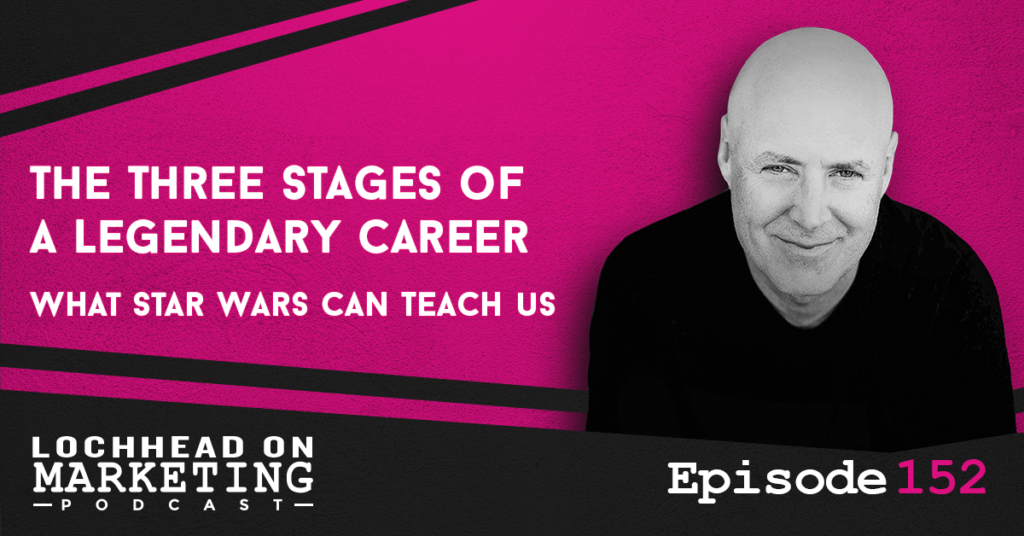
Podcast (lochheadonmarketing): Play in new window | Download (Duration: 17:34 — 12.1MB) | Embed
Subscribe: Apple Podcasts | Spotify | RSS | More
On this episode of Lochhead on Marketing, let’s talk about the three stages of a legendary career. Let’s also talk about the lessons we can learn about it from a source you wouldn’t think about at first, Star Wars. Yes, that Star Wars.
Welcome to Lochhead on Marketing. The number one charting marketing podcast for marketers, category designers, and entrepreneurs with a different mind.
Three Stages of Legendary Career: Star Wars Style
So how do we discuss legendary careers using Star Wars?
Well, if you look at it on a higher level, the three stages of having a legendary career follow a Jedi’s progression. There’s being a Luke / Lucy Skywalker stage, where you are just starting out. If you’re lucky and successful, there’s the Obi-Wan stage.
And if you are even more successful, and legendary at that, there’s the Yoda stage.
Jedi Breakdown
Let us explain even further.
When you’re first coming up, and if you are somebody who is gravitating towards the exponential different as opposed to the incremental better, or want to create, design, and dominate new future market categories, as opposed to just somebody who wants to kind of maintain the status quo, you get identified pretty quickly as being high potential. Much like Luke was as a padawan.
If this person is lucky and successful, and becomes a mentor or teacher for other upcoming high potential individuals, they enter their Obi-Wan stage. And if you end up being a legend in your chosen career, much like Yoda, you will have the authority and success that befits the position.
The True Reward
When I myself was a Luke, I thought that the rewards for being a person with high potential who excels and produces great results was that you get the recognition and fame, as well as the riches that come along with it.
But as you progress through the different levels of your career, you realize that while those rewards are worth pursuing, it is not the biggest reward out there.
The real reward is you get to a place in your 40s or 50s, where the world acknowledges you, as a champion, as a legendary Luke / Lucy Skywalker, and you graduate. Now, the world grants you the Obi-Wan status.
To hear more about the different legendary career and Star Wars, download and listen to this episode.
Bio
Christopher Lochhead is a #1 Apple podcaster and #1 Amazon bestselling co-author of books: Niche Down and Play Bigger.
He has been an advisor to over 50 venture-backed startups; a former three-time Silicon Valley public company CMO and an entrepreneur.
Furthermore, he has been called “one of the best minds in marketing” by The Marketing Journal, a “Human Exclamation Point” by Fast Company, a “quasar” by NBA legend Bill Walton and “off-putting to some” by The Economist.
In addition, he served as a chief marketing officer of software juggernaut Mercury Interactive. Hewlett-Packard acquired the company in 2006, for $4.5 billion.
He also co-founded the marketing consulting firm LOCHHEAD; the founding CMO of Internet consulting firm Scient, and served as head of marketing at the CRM software firm Vantive.
We hope you enjoyed this episode of Lochhead on Marketing™! Christopher loves hearing from his listeners. Feel free to email him, connect on Facebook, Twitter, Instagram, and subscribe on iTunes!
279 How To Improve Your Mental Health with Sarah Fay, PhD, Author of Pathological: The True Story of Six Misdiagnoses

Podcast: Play in new window | Download (Duration: 1:30:34 — 62.2MB) | Embed
Subscribe: Apple Podcasts | Spotify | Pandora | RSS | More
Welcome to the second part of a two-part series on neuro-diversity and mental health. If you happened to miss the first one, you can check out our dialogue with M.E. Thomas on psychopathy (FYD 277). On this episode of Christopher Lochhead: Follow Your Different, we talk about how to improve your mental health. And who better to have that conversation but with Sarah Fay, PhD.
Sarah Fay is a bestselling author, and her new book is called Pathological: The True Story of Six Misdiagnoses. Apple books said Sarah’s new book is “a powerful memoir by a deeply compelling person and a fantastic writer.”
Whether you are curious about neuro-diversity, or looking for ways to improve your mental health, you can’t go wrong with listening to this episode.
The world that Sarah Fay lives in
The conversation starts off on the topic of how Sarah is processing the world we live in today.
As someone who was in the vacuum of the academe for a while, one might not even notice the world outside. Sarah admits that she pretty much missed the Obama administration while she was working on her PhD.
There is a certain appeal of the academe of being away from the world and being surrounded by actual books, and being in pursuit of knowledge. That is, until the world comes calling.
How things have changed
Sarah shares that she has been writing about how different things have changed for her and how she saw herself. One of the things she has noticed is the change in her mental health, and how it has changed for the better.
“I was writing about how different things have changed for me and how I see myself. Now as someone who had a mental illness, I believe I’ve been cured. There’s no evidence to suggest that we cannot fully heal from mental illness, even serious mental illness like what I had.” – Sarah Fay
Sarah finds the notion that mental illness only lies dormant at times very pessimistic, as it sets the precedent that it could never be fully healed.
The Metaphor of Mental Illness
Sarah shares the metaphor of mental illness that she absolutely loves, which is much like breaking a bone.
“When you break a bone after it heals (which I didn’t know, this is in physical medicine), the point of the break becomes the strongest part. And so if we think of mental illness, or some sort of psychosis as a break, then we heal stronger.” – Sarah Fay
And if you look how resilient and strong people are who have recovered from mental illness, it makes a whole lot of sense for Sarah.
To hear more from Sarah Fay and how to improve your mental health, download and listen to this episode.
Bio
Sarah Fay (Ph.D., MFA) is an award-winning author and mental health advocate working to improve how we think and talk about our mental health.
Her experience of being diagnosed with six different mental health disorders and finding no relief led her to write her journalistic memoir Pathological: The True Story of Six Misdiagnoses, an Apple Best Books pick that was hailed in The New York Times as a “fiery manifesto of a memoir.”
Sarah has shared her story on NPR’s 1A, Oprah Daily, Salon, NPR’s KERA/Think, The Rumpus, in The Los Angeles Times, and more.
Pathological has been featured in Forbes, mindbodygreen, Thrive Global, Lit Hub, Psychology Today, and others.
Links
Connect with Sarah Fay!
We hope you enjoyed this episode of Follow Your Different™! Christopher loves hearing from his listeners. Feel free to email him, connect on Facebook, Twitter, Instagram and subscribe on iTunes!
278 A Love Letter To The United States of America
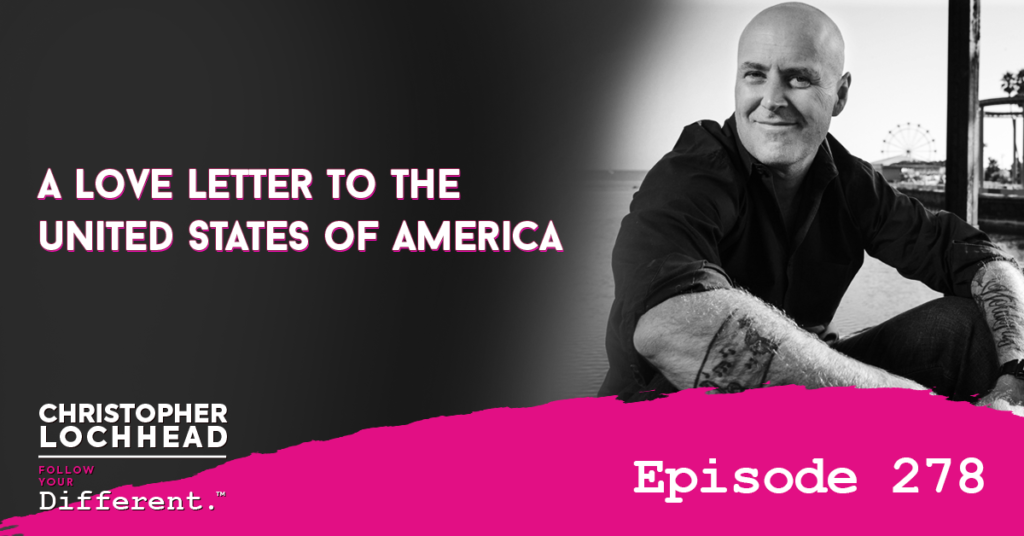
Podcast: Play in new window | Download (Duration: 8:49 — 6.1MB) | Embed
Subscribe: Apple Podcasts | Spotify | Pandora | RSS | More
This episode of Christopher Lochhead: Follow Your Different is a love letter to America.
I recently posted something on LinkedIn and on social media about the court’s decision to overturn Roe vs. Wade, and I wanted to share that with you and reflect on it with you for a moment.
So, let’s talk about America.
Roe v. Wade
People are saying this ruling put abortion back in the hands of the states.
Sort of, but not really.
It puts it back where it belongs in our hands. You and me get to decide what the future will be by voting.
A poll with 235,613 responses says that 58% support women’s rights to choose. Now, if the Democrats pick up seats in November, it will in large part demonstrate what Americans think about some combination of the abortion issue. And broadly, the Democratic agenda and how the Democrats have been performing in the White House and in Washington.
With Biden at 38% approval, it seems very likely that the Dems will pick up seats in November. If the predicted red wave hits Washington, it will for sure tell us that some combination of dislike for Biden, the GOP’s ideas resonating. and pro-life momentum are things that Americans are focused on.
Continue to have Meaningful Dialogue
Whether you’re currently celebrating or reverberating over the road decision. It’s important to underscore this is how it’s supposed to work.
We argue, we debate and hopefully we even listen radical idea, right? to each other. We come to our own conclusions, and we vote for candidates who most reflect our beliefs. Hating someone because they disagree with you might be the biggest stupid of all.
Now, to be clear, I am pro-choice. And I could tell you why if you cared, and I respect that pro-life people truly believe they are doing what’s best what’s right. And I know and love people who I know to be legendary, very good people who are pro-life. I just disagree with them. That’s okay. Steel sharpens steel. This is how it’s supposed to work. Please participate in thoughtful dialogue. And let’s all do some thinking, then let’s vote.
So that was the post and it seems to have blown up and hopefully caused some thought for a conversation. Some people have commented No, this is not how it’s supposed to work. And they have an opinion about why that’s the case. They might be right. But at a very high level.
The difference between democracy and insanity is we dialogue. We vote. We create leaders and create laws and then we live by them. What we don’t do is hate each other. And we don’t fight with each other physically. That’s called anarchy. And so I think what this tells all of us is, democracy is a participation sport.
To hear more of Christopher Lochhead’s love letter to the United States of America, download and listen to this episode.
Bio
We hope you enjoyed this episode of Christopher Lochhead: Follow Your Different™! Christopher loves hearing from his listeners. Feel free to email him, connect on Facebook, Twitter, Instagram and subscribe on iTunes!
277 Confessions of a Sociopath with M.E. Thomas
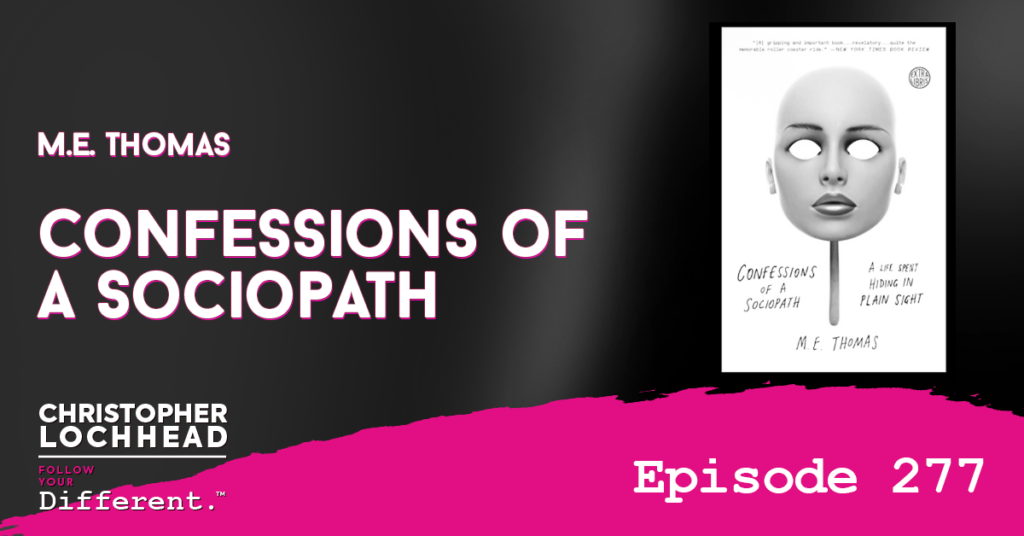
Podcast: Play in new window | Download (Duration: 1:39:01 — 68.0MB) | Embed
Subscribe: Apple Podcasts | Spotify | Pandora | RSS | More
On this remarkable episode of Christopher Lochhead: Follow Your Different, we talk with M.E. Thomas about psychopathy, and how you can be in a relationship that works with a psychopath.
M.E. Thomas is a pseudonym of the bestselling author of Confessions of a Sociopath. She’s a lawyer, musician, and now a teacher. She is among the first psychopaths or sociopaths to come out of the closet, and share her life and experience.
This episode will have you thinking deeply about your identity, relationships, and the masks that we all wear. So stay tuned.
M.E. Thomas on Knowing she was “Different”
The conversation started with the question of identity. Specifically, about when M.E. Thomas found out she was “Different”.
“I always knew that I was different. But I had so many things that they’d be different, I just assumed it was one those – like, I was raised in a big Mormon family, so I grew up with five siblings. We just had weird idiosyncrasies. My dad was kind of a crazy guy. Even now, they call him Einstein because he wears his hair, kind of like white and crazy, and his eyebrows were long and curly. He says, he thinks that makes him look distinguished.” – M.E. Thomas
Aside from this, there were a lot of things that people would think weird about her. But it came off most of the times as precocious and charming as a child, and cool and collected growing up.
M.E. Thomas on Not Experiencing the Same Things
Another way M.E. Thomas knew she was different from others was when she and the other kids her age hit puberty. Simply put, she wasn’t experiencing the same things that others were being self-conscious or worried about.
“During puberty, everybody was kind of losing their collective minds. And I was just like, “I don’t get it”. I didn’t get the self-consciousness, and I didn’t get the awkwardness. And I didn’t get the kind of like, “we’re going through some sort of new identity”. I kind of didn’t get that, although I got it in a way because I would kind of choose a new identity every day for whatever situation I was in.” – M.E. Thomas
Looking back, M.E. Thomas was kind of relieved that she didn’t go through all that, citing a Reddit page that showed teenagers and all the stupid things they did and wear growing up.
How to Work the Social System
M.E. Thomas muses that she was glad that she didn’t go through the same experience, as she’s heard stories of how people were both very happy and unhappy during those times in their life. She particularly calls out peer pressure, which is probably the number one reason teenagers do stupid things for stupid reasons.
She herself wasn’t subjected to peer pressure, because she admits that she already knew how to work the social system even then. Given the cool demeanor she portrays, she was easily part of every social circle and friends with different groups. Though she does say that being that much of a social butterfly should’ve been an indicator of a personality disorder.
To learn more about M.E. Thomas and her experiences growing up, download and listen to this episode.
Bio
M. E. Thomas (a pseudonym) is the author of Confessions of a Sociopath: A Life Spent Hiding in Plain Sight. (Penguin Random House)
She is a former law professor who has written extensively on music copyright issues, a current California attorney, and the founder of a non-profit. She is also, most recently, a professional musician.
Links
Connect with M.E. Thomas!
Website | Twitter | More about the Author
More about M.E. Thomas
NYTimes: Confessions of a Sociopath
Slate: American Psychopath’s Patrick Bateman Reviews M.E. Thomas’ Confession of a Sociopath
YouTube: Ask a Psychopath – What is your background?
YouTube: Ask a Psychopath – What are some things you’ve done?
We hope you enjoyed this episode of Follow Your Different™! Christopher loves hearing from his listeners. Feel free to email him, connect on Facebook, Twitter, Instagram and subscribe on iTunes!
151 How To Drive Short Term Revenue Now
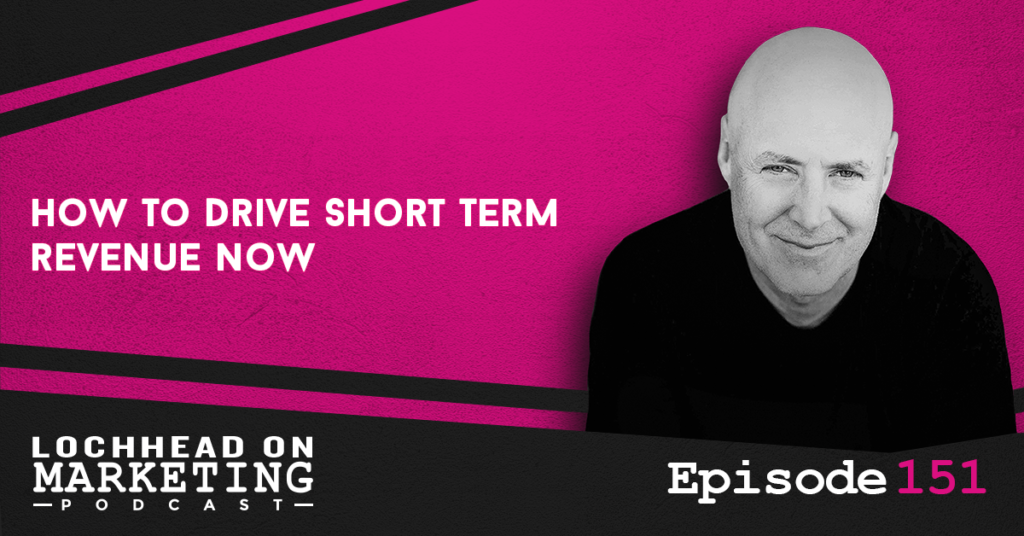
Podcast (lochheadonmarketing): Play in new window | Download (Duration: 21:50 — 15.0MB) | Embed
Subscribe: Apple Podcasts | Spotify | RSS | More
On this episode of Lochhead on Marketing, let’s talk about how to use category design thinking to drive short term revenue.
We talked a lot about what to do in a recession on our last episode, and on this episode, we’re going deep on a very specific topic, about how to make the cash register sing immediately.
Welcome to Lochhead on Marketing. The number one charting marketing podcast for marketers, category designers, and entrepreneurs with a different mind.
Short Term Category Design
One of the things that we hear about category design is category design is too expensive. Only big companies can design categories, or it takes too long it takes six to 10 years to build a category, we need revenue now. But the truth is that category design can drive revenue for you in the next immediate term days or weeks if you take a category science approach.
As we talked about on the last episode, most companies in a downturn compete harder and harder for demand existing demand that is falling. And it’s like fighting for the falling demand knife and cutting yourself into shreds.
Category design is distinct from Legacy approaches to marketing is actually the cheapest, fastest way to make the cash register sing.
Things to Consider
What I’m about to share with you is work that call Eddie and I are currently in the process of helping a legendary b2c tech company who is scaling at over 100% a year. In spite of that, they wanted to get really focused, particularly with the economy doing what it’s doing on how to continue their triple digit plus growth.
First, it starts with an understanding of super consumers. The general idea is that a very small number of consumers, customers, clients, readers, you know, consumers of any kind customers of any kind, typically 10% or less are the ones that are on the bleeding edge of what makes a category go. They’re super influential. They’re super committed to the category and typically to the brand leader in that category. They also tend to drive a lot of innovation; they also tend to be the ones that evangelize the loudest. So the first step is knowing your super consumers, and observing them.
This leads to the second point, which is a genius insight from Eddie, is that a super of one is a super of nine. That is to say, people who are passionate about something, tend to be passionate about several things. So what are the adjacencies that the Supers might also love? There’s a whole bunch of categories that they might be interested in.
To learn more about how to drive short term revenue through category design, download and listen to this episode.
Bio
Christopher Lochhead is a #1 Apple podcaster and #1 Amazon bestselling co-author of books: Niche Down and Play Bigger.
He has been an advisor to over 50 venture-backed startups; a former three-time Silicon Valley public company CMO and an entrepreneur.
Furthermore, he has been called “one of the best minds in marketing” by The Marketing Journal, a “Human Exclamation Point” by Fast Company, a “quasar” by NBA legend Bill Walton and “off-putting to some” by The Economist.
In addition, he served as a chief marketing officer of software juggernaut Mercury Interactive. Hewlett-Packard acquired the company in 2006, for $4.5 billion.
He also co-founded the marketing consulting firm LOCHHEAD; the founding CMO of Internet consulting firm Scient, and served as head of marketing at the CRM software firm Vantive.
We hope you enjoyed this episode of Lochhead on Marketing™! Christopher loves hearing from his listeners. Feel free to email him, connect on Facebook, Twitter, Instagram, and subscribe on iTunes!
276 The Voice In Your Head, Why It Matters, & How To Harness It with Psychologist & Author of “Chatter” Ethan Kross
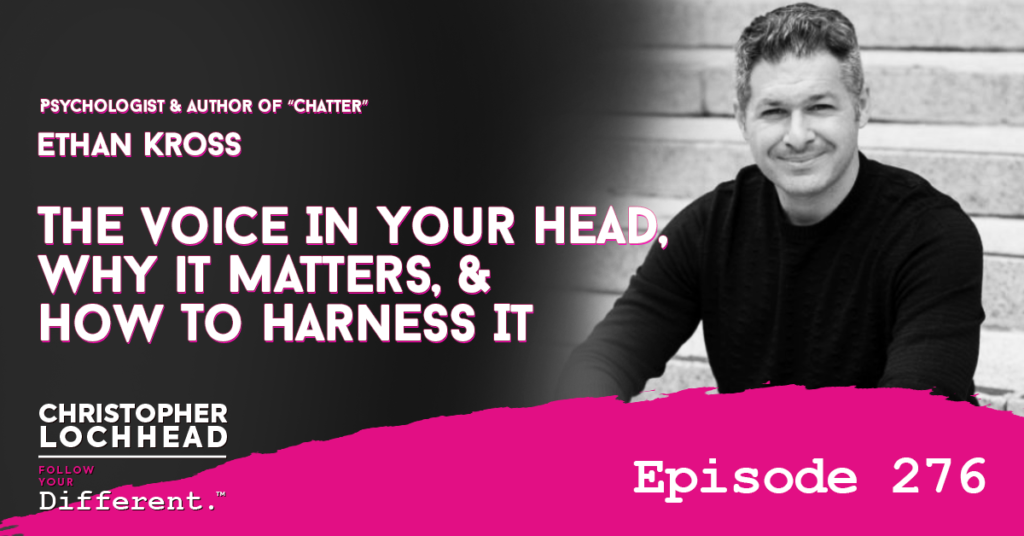
Podcast: Play in new window | Download (Duration: 1:16:56 — 52.8MB) | Embed
Subscribe: Apple Podcasts | Spotify | Pandora | RSS | More
On this episode of Christopher Lochhead: Follow Your Different, we talk about those voices in your head with our award-winning guest, Dr. Ethan Kross. Who knows, you might learn something useful from listening to it.
Dr. Ethan Kross is an award-winning psychologist and professor at the University of Michigan and the Ross School of Business. He has a new book out called Chatter: the voice in your head, why it matters and how to harness it. Bestselling author Adam Grant says, “this book is going to fundamentally change some of the most important conversations in your life, the ones you have with yourself.”
So if you want to know how you can work with those voices in your head to make your life better, stay tuned to this episode.
Ethan Kross on the Voices in your head
The conversation starts off with the topic of Ethan Kross’ new book, Chatter. Ethan explains that we all have an inner voice, which is the ability to silently use language to reflect on our lives.
“it’s a tool of the mind. It’s a tool that that distinguishes us from every single other animal species. You use language silently in your head to do all sorts of things like, simulate and plan for the future. You use this inner voice to do something I find to be magical, which is tell stories about our experiences in this world. Stories that help us understand who we are.” – Ethan Kross
Chatter
According to Ethan, there are times when this inner voice we possess doesn’t work so well.
“Sometimes when you experience adversity, you reflexively tried to use this tool to think through a problem, but you don’t come up with a clear solution. You end up for lack of a better term spinning, worry, ruminating catastrophizing. And that’s what I call chatter.” – Ethan Kross
Chatter sometimes takes the form of an inner critic. Sometimes, it’s a self-disparaging voice. Sometimes it’s an inner monologue filled with anger and aggression. But the idea here is that you’re just getting stuck in this negative thought loop, and you can’t break free.
Ethan Kross on Metacognition
We bring up the topic of “thinking about thinking”, and Ethan shares his thoughts on the matter. For Ethan, most people actually do a lot of thinking about thinking, or metacognition.
“Basically, Metacognition refers to exactly what you’re talking about: thinking about thinking. And I think we spend a lot of time doing this in ways that create misery. And, like, when we’re worried about stuff we keep on, you know, we start worrying, like, think about what worry is, there’s something in the future that you’re concerned about. At some point, you start worrying about the fact that you’re worrying.” – Ethan Kross
He then used sleep as an example. At first, it’s simple: you sleep when you are tired. But as we think about other things like “are we getting enough sleep,” and the effects of not staying up late, etc. We start to worry about too many hypothetical things in our head, and we, ironically, lose sleep over it.
To hear more from Ethan Kross and how to channel your inner voice to be more productive in life, download and listen to this episode.
Bio
Ethan Kross, PhD, is one of the world’s leading experts on controlling the conscious mind. An award-winning professor at the University of Michigan and the Ross School of Business, he is the director of the Emotion & Self Control Laboratory.
He has participated in policy discussion at the White House and has been interviewed on CBS Evening News, Good Morning America, Anderson Cooper Full Circle, and NPR’s Morning Edition. His pioneering research has been featured in The New York Times, The New Yorker, The Wall Street Journal, USA Today, The New England Journal of Medicine, and Science.
He completed his BA at the University of Pennsylvania and his PhD at Columbia University.
Links
Connect with Ethan Kross!
Website | LinkedIn | Twitter | More about Ethan | Chatter
We hope you enjoyed this episode of Follow Your Different™! Christopher loves hearing from his listeners. Feel free to email him, connect on Facebook, Twitter, Instagram and subscribe on iTunes!
275 Sonic Brand & Why You Need One with Emmy™Award-Winning Sonic Branding Category Queen Audrey Arbeeny
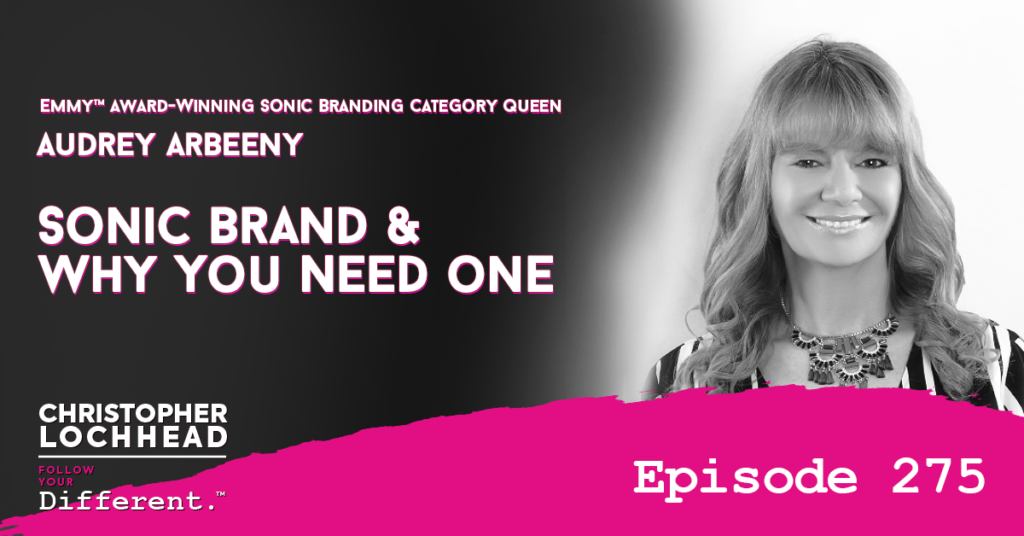
Podcast: Play in new window | Download (Duration: 1:16:13 — 52.3MB) | Embed
Subscribe: Apple Podcasts | Spotify | Pandora | RSS | More
If you’ve ever watched the Olympics, gone to a Major League game, or even turned on your Xbox, chances are you’ve seen our guest’s great work. On this episode of Christopher Lochhead: Follow Your Different, we have a dialogue with Audrey Arbeeny, the Category Queen of Sonic Branding.
Audrey Arbeeny presented the discipline of Sonic Branding, way back in 1993 at the Design Management Institute in Amsterdam. Now that Sonic Branding has exploded, particularly as digital products have, it has been become a giant category across all kinds of areas marketing, branding, product design, and experience design in the arts world and the film to entertainment world.
So if you are interested about Sonic Branding, and how it blitzed through the competition, stay tuned to this episode.
Audrey Arbeeny on Sonic Branding
The conversation starts off with defining what Sonic Branding is. Audrey has this to say on the matter:
“I believe what you’re doing is the same thing as when we did the original Major League Soccer, Anthem, and we do our Sonic Branding. The deputy commissioner in the interview said, he heard from player after player that when they heard that song, it put them in the right frame of mind it put them in a place that they wanted to be in, and it prepared them to get ready for the game.
I have certain songs I play also, when I need to get in a certain frame of mind. And that’s what Sonic Branding is. You want to get to that emotional center of the brain that triggers play.” – Audrey Arbeeny
Biomusicology
If you’re wondering if there is a word for that, yes there is. It’s called Biomusicology, and it covers how sounds and music can affect our brain and biology. Sometimes, music can even evoke physical reactions from us, as seen in the revelry in anthems, or that welling feeling you might get while listening to an orchestra.
“We’re a vibratory system. And that’s what it is. And from as early as time as you could remember, that’s what sound did. It connected people. It communicated and it made people feel, feel physically emotionally connected.” – Audrey Arbeeny
Audio Brain Advocates for Health and Well-being
Audrey shares a personal experience where music and hearing familiar sounds in someone’s vicinity had helped people ease their pain and their well-being.
So while Sonic Branding is being used on all these global brands, Audrey also hopes to advocate the use of music and different sounds to promote health and well-being to everyone.
“Yes, we do all these global brands? We’ve been music supervisors for 10 Olympics for NBC Olympics. That’s 25 years. Yes, we’ve done great things like that. But we’ve also done a lot in health care. And I’ve done a lot of research in health and well-being. And I’ve worked with kids that were deaf and blind, and done music therapy with them.
Because when you’re in that situation, nobody really takes the time to make sure you’re enjoying that meal and spends a lot of time they have a lot of kids to take care of. So that’s my North Star. That’s my passion point. And audio brain has done a lot of a lot of pro bono work in that area.” – Audrey Arbeeny
To hear more from Audrey Arbeeny, Sonic Branding, and how music can help your well-being, download and listen to this episode.
Bio
Audrey Arbeeny
As Owner and Emmy™ Award-Winning Executive Producer/ Creative Director for Audiobrain, a globally recognized sonic branding boutique dedicated to the intentional development of music and sound, Audrey Arbeeny has realized her dream of combining her lifelong love of music and science with proven business skills. Audrey oversees Audiobrain’s projects from start to finish, coordinating logistics, strategy, experience design, resources, and talent. In addition, Audrey oversees Audiobrain’s ongoing research in areas of psychoacoustics and biomusicology. With over 20 years of experience, she is recognized throughout the world as a pioneer in sonic branding, presenting on this discipline as early as the 1993 Design Management Institute in Amsterdam. Audiobrain has consistently stayed leaders in this field through innovation, research, education, advanced technological skills, and forward- thinking initiatives for some of the world’s largest brands.
Music has long been an important part of Audrey’s life. She began formal piano training at the age of four. She is also an accomplished flutist and studied voice at Carnegie Hall, under the late Silas Engum, for many years. In addition to her musical talents, she has extensive recording, editing, licensing, interactive, and sonic branding experience.
Audrey is highly skilled in many areas of sonic branding development and implementation. Her environmental branding leadership includes her role as Music Supervisor the past 7 Olympic Broadcasts for NBC, garnering her 2 Emmy™ awards for her work on the 2008 Beijing and 2012 London Games. She has also done extensive experience design for IBM’s Marketing Exposition and Sense Layering Team, The Retail Federation’s Design for the Senses Pavilion, Holland America Cruise Lines Onboard Experience Design, and United Healthcare Retail Environments to name a few.
She has been Creative Director / Head of Production for the strategic development of brands’ sounds including Microsoft’s Xbox 360, Virgin Mobile USA, Glaxo Smith Kline, Google, Logitech, Major League Soccer, KIA Motors Corp. The New York Giants, McDonald’s, Merck, and HBO to name a few. In 2015, Audrey was elected to the Board of Governors for the National Academy of Television Arts and Sciences New York Chapter. She also teaches sonic branding at New York’s Pratt Institute, the first and only course of its kind.
Audrey is currently in the process of undertaking a research study focusing the effects of sound on patients, staff, and families in intensive care units with a world-renowned medical facility, “Music and sound are far more important than most people realize, and we’ll be developing studies to substantiate our theories about its effect on wellness and healing”. This constant search for knowledge, exploration and new ways of thinking about sound are why Audrey is one of the most respected influencers in her industry. She is a sought-after guest speaker and has educated on sonic branding all over the world.
Links
Follow Audrey Arbeeny today!
Web | LinkedIn | Twitter | Facebook
We hope you enjoyed this episode of Follow Your Different™! Christopher loves hearing from his listeners. Feel free to email him, connect on Facebook, Twitter, Instagram and subscribe on iTunes!

